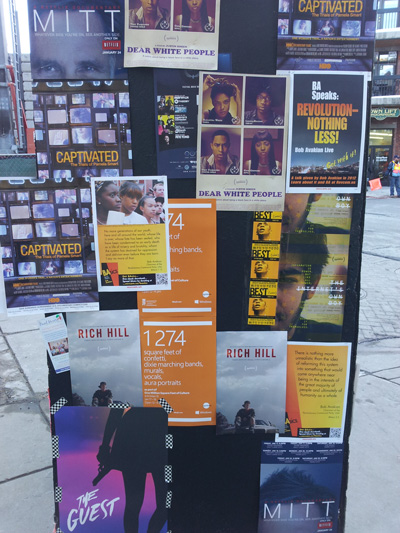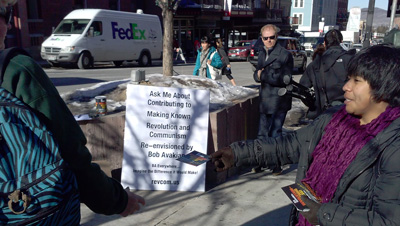Making BA Everywhere a Big Deal at the Sundance Film Festival
February 3, 2014 | Revolution Newspaper | revcom.us
From readers:
We went to make BA Everywhere a big, big deal all over the Sundance Film Festival.
As reported last week, a team of revolutionaries whose efforts were funded by the Bob Avakian Institute spent 10 days at the Sundance Film Festival. The team included a couple of people who had gone before and were able to bring to bear their experience and understanding of the strategic significance of bringing BA Everywhere to this event. This was an opportunity to reach hundreds of artists and funders, critical and creative thinkers, many who had deep concerns over the state of the world and who were all about communicating big ideas on a societal stage.

Sundance movie posters, January 2014
This year a larger team was added to this effort—a group of mainly young revolutionaries who came to Sundance to work in all kinds of different ways to take out the BA Everywhere campaign very broadly. This additional four-person team wanted to impact the whole scene in tandem with the work being done by revolutionaries inside the festival, participating at the post-screening discussions and panels. They also knew that prominent people working in film were also on the streets and among the tens of thousands who made up the audiences and sought them out wherever they went.
Most of the people in the team had never talked to filmmakers—which included everyone from directors and screenwriters, actors, cinematographers, composers, and those who fund these projects and get them out into the world. And they had little experience in directly engaging with the very wealthy. This would change quickly.
The first few days, the team went out to Main Street. Thousands of people would come to meet up with friends, attend receptions for films, hear live music and see art installations, hear panels and just be in the center of the film festival. They went out with beautiful enlarged posters with quotes from BAsics that were picked especially for Sundance:
In a world marked by profound class divisions and social inequality, to talk about “democracy”—without talking about the class nature of that democracy and which class it serves—is meaningless, and worse. So long as society is divided into classes, there can be no “democracy for all”: one class or another will rule, and it will uphold and promote that kind of democracy which serves its interests and goals. The question is: which class will rule and whether its rule, and its system of democracy, will serve the continuation, or the eventual abolition, of class divisions and the corresponding relations of exploitation, oppression and inequality. (BAsics 1:22)
There is nothing more unrealistic than the idea of reforming this system into something that would come anywhere near being in the interests of the great majority of people and ultimately of humanity as a whole. (BAsics 3:2)

"Ask Me About Contributing to Making Known Revolution and Communism Re-envisioned by Bob Avakian—BA Everywhere...Imagine the Different It Could Make!" at Sundance, January 2014
And thousands of palm cards with these quotes advertising the free BAsics e-book went out. Posters went up in shop windows and on big kiosks that lined the street—advertising the film BA Speaks: REVOLUTION— NOTHING LESS! and quotes from BAsics. Store owners and film festival storefronts also took palm cards for people to pick up on their counters. A photo of a revolutionary putting up a BA Speaks: REVOLUTION—NOTHING LESS! poster ran on the front page of the daily Park Record newspaper.
Close to 2,000 copies of the flyer “Contribute to BA Everywhere! The World Needs to be Radically Changed. Here’s Step One” went out. And this call was given specifically to every filmmaker and potential big donor that the revolutionaries were able to meet even briefly, along with copies of key works by or about BA.
The team also put up a big sign on Main Street that read:
Ask Me About Contributing
to Making Known
Revolution and Communism
Re-envisioned by Bob Avakian—
BA Everywhere...Imagine the Difference It Could Make!
This sign was also made into a laminate for the team to put on their bags. This came in handy at a party where the music was too loud to be heard but people would read the laminate and conversations would start from there.
This was how the team stepped to people, talking about BA and calling on people to engage with his work, to talk about why BA Everywhere was the leading edge of a whole ensemble of revolutionary work that was crucial to changing the world—and calling on them to make the level of financial contributions that could enable this to have real societal impact. It was important that all of this be presented not as a set of interesting ideas but as part of building a movement for revolution. One team member put it that they were at first mainly aiming at just getting things into the hands of filmmakers and actors and possibly getting a way to reach them, and this changed when she had her first real struggle with a film director she addressed at a panel—over the need for revolution and why BA was so important in that context. When the director gave her his business card, she knew that he knew what the next conversation would be about and that it mattered.
The two quotes from BAsics were completely on the mark at Sundance as we would find out, in talking to filmmakers who were addressing important issues but without a communist framework would be left looking for change within the context of the existing system. The special issue of Revolution newspaper—"You Don’t Know What You Think You 'Know' About...The Communist Revolution and the REAL Path to Emancipation: Its History and Our Future"—was also given to people, because they really didn’t know.
After the fourth day, when the Main Street crowd was thinning, the team decided to split up and go to as many films and panels and parties as they could. They talked about how they could carve in during the audience Q&As and listened to examples about how a revolutionary spoke out at panels and films, taking the topic at hand but completely reframing it, speaking to it in the context of the larger reality and the need for revolution. She drew from BA’s work in her question and introduced herself as part of a movement for revolution. Everyone teamed up to do the same—less experienced people going with those who had more experience—or just teaming up with each other or going solo—watching films or listening to presentations and figuring it out on the spot. Everyone would each go to a number of movies and panels and parties each day. People would sum up quickly and figure out what was good about what they did and how this could have been done better. And then they would move on—going out to cover as much ground as possible. Doing this was really challenging and also exciting because you really did have to figure out how to carve into the discussions—bringing a whole different understanding to the room about the topic at hand and asking a question that would enable a deeper discussion over the nature of the problem they were addressing. As someone put it—it really is finding how communism springs from every pore of society.
Many films spoke directly to burning issues—on women, on Black people, on abortion, on suppression of knowledge, on the lives of oppressed people internationally, on atomization and alienation, the relationship of truth and morality, and themes about the creative process that have everything to do with how one comes to understand the world around us.
The team learned from the films. A narrative on Guantánamo brought you to appreciate the preciousness of the lives of those imprisoned there and how a rebellious GI comes to learn this. There was a film powerfully showing the lives of three poor white kids in the de-industrialized Midwest—with images of the American flag throughout in contrast to the reality of the American dream—and with one kid getting a letter from his mother in prison with the flag pasted on upside down. There was an important film about the courage of those who took part in the first Freedom Summer in the South during the 1960s. Another film was about how good having an abortion is!
Throughout the festival, they found filmmakers who were telling important stories about the lives of people all around the world—films that raised big questions about the kind of world we live in. A number of filmmakers expressed their appreciation for the questions posed by the revolutionaries, answered them with a lot of seriousness, and even referred to them in later comments. In other cases there was more controversy and this was also a good thing. There was an example where a debate that revolutionaries initiated became the grist for discussions among filmmakers well after the particular event.
The team also went to parties—parties for particular films, some hosted by sponsors and popularizers, and others speaking to various issues—e.g., women in film, Black filmmakers. This was something new for people—just going in to a party where you knew no one and striking up conversations with people. As someone said, you just went in and thought about how we all live in this same nightmare of a world and then you were off and running. We found many people there who never expected to spend the evening talking about the need for revolution and were open and appreciative. As the 10 days passed, there was a growing understanding of the importance of what was being accomplished. On the final night—everyone went to the awards party and was able to reconnect with people they had met and got out materials to award winners and presenters. Some recalled having heard the revolutionaries speak up at a certain event or just out on Main Street. By the end of the festival we had collected contact information from dozens of filmmakers and gotten copies of BA’s most important works into their hands.
Over the ten days at Sundance, a great deal was learned, and everyone felt the whole group had indeed accomplished some important things. People talked about how they themselves look at things differently now—the potential and importance of reaching this section of people—and the basis for repolarization for revolution. One person boiled it down to the fact that in everything we were doing, we had to lead. We had to bring to people a very profound understanding of how the world can be radically changed and there was an all-around desire to take what we had learned much, much further.
If you like this article, subscribe, donate to and sustain Revolution newspaper.
